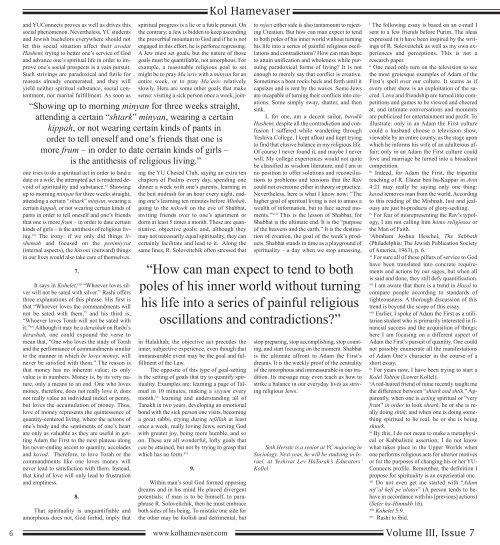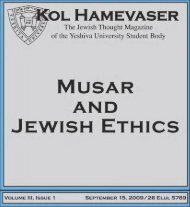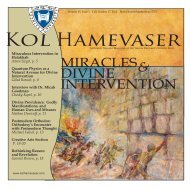Create successful ePaper yourself
Turn your PDF publications into a flip-book with our unique Google optimized e-Paper software.
<strong>and</strong> YUConnects proves as well as drives this<br />
social phenomenon. Nevertheless, YC students<br />
<strong>and</strong> Jewish bachelors everywhere should not<br />
let this social situation affect their avodat<br />
Hashem; trying to better one’s service of God<br />
<strong>and</strong> advance one’s spiritual life in order to improve<br />
one’s social prospects is a vain pursuit.<br />
Such strivings are paradoxical <strong>and</strong> futile for<br />
reasons already enumerated, <strong>and</strong> they will<br />
yield neither spiritual substance, social contentment,<br />
nor marital fulfillment. As soon as<br />
one tries to do a spiritual act in order to l<strong>and</strong> a<br />
date or a wife, the attempted act is rendered devoid<br />
of spirituality <strong>and</strong> substance. xi Showing<br />
up to morning minyan for three weeks straight,<br />
attending a certain “shtark” minyan, wearing a<br />
certain kippah, or not wearing certain kinds of<br />
pants in order to tell oneself <strong>and</strong> one’s friends<br />
that one is more frum – in order to date certain<br />
kinds of girls – is the antithesis of religious living.<br />
xii The irony: if we only did things lishemah<br />
<strong>and</strong> focused on the penimiyyut<br />
(internal aspects), the hitsoni (outward) things<br />
in our lives would also take care of themselves.<br />
7.<br />
It says in Kohelet, xiii “Whoever loves silver<br />
will not be sated with silver.” Rashi offers<br />
three explanations of this phrase. His first is<br />
that “Whoever loves the comm<strong>and</strong>ments will<br />
not be sated with them,” <strong>and</strong> his third is,<br />
“Whoever loves Torah will not be sated with<br />
it.” xiv Although it may be a derashah on Rashi’s<br />
derashah, one could expound the verse to<br />
mean that, “One who loves the study of Torah<br />
<strong>and</strong> the performance of comm<strong>and</strong>ments similar<br />
to the manner in which he loves money, will<br />
never be satisfied with them.” The reason is<br />
that money has no inherent value; its only<br />
value is in numbers. Money is, by its very nature,<br />
only a means to an end. One who loves<br />
money, therefore, does not really love it, does<br />
not really value an individual nickel or penny,<br />
but loves the accumulation of money. Thus,<br />
love of money represents the quintessence of<br />
quantity-centered living, where the actions of<br />
one’s body <strong>and</strong> the sentiments of one’s heart<br />
are only as valuable as they are useful in getting<br />
Adam the First to the next plateau along<br />
his never-ending ascent to quantity, accolades<br />
<strong>and</strong> kavod. Therefore, to love Torah or the<br />
comm<strong>and</strong>ments like one loves money will<br />
never lead to satisfaction with them. Instead,<br />
that kind of love will only lead to frustration<br />
<strong>and</strong> emptiness.<br />
8.<br />
That spirituality is unquantifiable <strong>and</strong><br />
amorphous does not, God forbid, imply that<br />
spiritual progress is a lie or a futile pursuit. On<br />
the contrary; a Jew is bidden to keep ascending<br />
the proverbial mountain to God <strong>and</strong> if he is not<br />
engaged in this effort, he is perforce regressing.<br />
A Jew must set goals, but the nature of those<br />
goals must be quantifiable, not amorphous. For<br />
example, a reasonable religious goal to set<br />
might be to pray Ma’ariv with a minyan for an<br />
entire week, or to pray Ma’ariv relatively<br />
slowly. Here are some other goals that make<br />
sense: visiting a sick person once a week, join-<br />
“Showing up to morning minyan for three weeks straight,<br />
attending a certain “shtark” minyan, wearing a certain<br />
kippah, or not wearing certain kinds of pants in<br />
order to tell oneself <strong>and</strong> one’s friends that one is<br />
more frum – in order to date certain kinds of girls –<br />
is the antithesis of religious living.”<br />
ing the YU Chesed Club, saying an extra ten<br />
chapters of Psalms every day, spending one<br />
dinner a week with one’s parents, learning in<br />
the beit midrash for an hour every night, ending<br />
one’s learning ten minutes before Minhah,<br />
going to the mikveh on the eve of Shabbat,<br />
inviting friends over to one’s apartment or<br />
dorm at least 5 times a month. These are quantitative,<br />
objective goals; <strong>and</strong>, although they<br />
may not necessarily equal spirituality, they can<br />
certainly facilitate <strong>and</strong> lead to it. Along the<br />
same lines, R. Soloveitchik often stressed that<br />
in <strong>Halakhah</strong>, the objective act precedes the<br />
inner, subjective experience, even though that<br />
immeasurable event may be the goal <strong>and</strong> fulfillment<br />
of the Law.<br />
The opposite of this type of goal-setting<br />
is the setting of goals that try to quantify spirituality.<br />
Examples are: learning a page of Talmud<br />
in 10 minutes, making a siyyum every<br />
month, xv learning <strong>and</strong> underst<strong>and</strong>ing all of<br />
Tanakh in two years, developing an emotional<br />
bond with the sick person one visits, becoming<br />
a great rabbi, crying during tefillah at least<br />
once a week, really loving Jews, serving God<br />
with greater joy, being more humble, <strong>and</strong> so<br />
on. These are all wonderful, lofty goals that<br />
can be attained, but not by trying to grasp that<br />
which has no form. xvi<br />
9.<br />
Within man’s soul God formed opposing<br />
dreams <strong>and</strong> in his mind He placed divergent<br />
potentials; if man is to be himself, to paraphrase<br />
R. Soloveitchik, then he must embrace<br />
both sides of his being. To mistake one side for<br />
the other may be foolish <strong>and</strong> detrimental, but<br />
<strong>Kol</strong> <strong>Hamevaser</strong><br />
to reject either side is also tantamount to rejecting<br />
Creation. But how can man expect to tend<br />
to both poles of his inner world without turning<br />
his life into a series of painful religious oscillations<br />
<strong>and</strong> contradictions? How can man hope<br />
to attain unification <strong>and</strong> wholeness while pursuing<br />
paradoxical forms of living? It is not<br />
enough to merely say that conflict is creative.<br />
Sometimes a boat rocks back <strong>and</strong> forth until it<br />
capsizes <strong>and</strong> is rent by the waves. Some Jews<br />
are incapable of turning their conflicts into creations.<br />
Some simply sway, shatter, <strong>and</strong> then<br />
sink.<br />
I, for one, am a decent sailor, barukh<br />
Hashem; despite all the contradiction <strong>and</strong> confusion<br />
I suffered while w<strong>and</strong>ering through<br />
Yeshiva College, I kept afloat <strong>and</strong> kept trying<br />
to find that elusive balance in my religious life.<br />
Of course I never found it, <strong>and</strong> maybe I never<br />
will. My college experiences would not quite<br />
be classified as wisdom literature, <strong>and</strong> I am in<br />
no position to offer solutions <strong>and</strong> reconciliations<br />
to problems <strong>and</strong> tensions that the Rav<br />
could not overcome either in theory or practice.<br />
Nevertheless, here is what I know now: “The<br />
higher goal of spiritual living is not to amass a<br />
wealth of information, but to face sacred moments.”<br />
xvii This is the lesson of Shabbat, for<br />
Shabbat is the ultimate end. It is the “purpose<br />
of the heavens <strong>and</strong> the earth.” It is the destination<br />
of creation, the goal of the week’s products.<br />
Shabbat st<strong>and</strong>s in time as a playground of<br />
spirituality – a day when we stop amassing,<br />
“How can man expect to tend to both<br />
poles of his inner world without turning<br />
his life into a series of painful religious<br />
oscillations <strong>and</strong> contradictions?”<br />
stop preparing, stop accomplishing, stop counting,<br />
<strong>and</strong> start focusing on the moment. Shabbat<br />
is the ultimate affront to Adam the First’s<br />
dreams. It is the weekly proof of the centrality<br />
of the amorphous <strong>and</strong> immeasurable in our tradition.<br />
Its message may even teach us how to<br />
strike a balance in our everyday lives as striving<br />
religious Jews.<br />
Seth Herstic is a senior at YC majoring in<br />
Sociology. Next year, he will be studying in Israel,<br />
at Yeshivat Lev HaTorah’s Educators’<br />
<strong>Kol</strong>lel.<br />
i The following essay is based on an e-mail I<br />
sent to a few friends before Purim. The ideas<br />
expressed in it have been inspired by the writings<br />
of R. Soloveitchik as well as my own experiences<br />
<strong>and</strong> perceptions. This is not a<br />
research paper.<br />
ii One need only turn on the television to see<br />
the most grotesque examples of Adam of the<br />
First’s spell over our culture. It seems as if<br />
every other show is an exploitation of the sacred.<br />
Love <strong>and</strong> friendship are turned into competitions<br />
<strong>and</strong> games to be viewed <strong>and</strong> cheered<br />
at, <strong>and</strong> intimate conversations <strong>and</strong> moments<br />
are publicized for entertainment <strong>and</strong> profit. To<br />
illustrate: only in an Adam the First culture<br />
could a husb<strong>and</strong> choose a television show,<br />
viewable by an entire county, as the stage upon<br />
which he informs his wife of an adulterous affair;<br />
only in an Adam the First culture could<br />
love <strong>and</strong> marriage be turned into a broadcast<br />
competition.<br />
iii Indeed, for Adam the First, the tripartite<br />
teaching of R. Elazar ben ha-Kappar in Avot<br />
4:21 may really be saying only one thing:<br />
kavod removes man from the world. According<br />
to this reading of the Mishnah, lust <strong>and</strong> jealousy<br />
are just bi-products of glory-seeking.<br />
iv For fear of misrepresenting the Rav’s typology,<br />
I am not calling him homo religiosus or<br />
the Man of Faith.<br />
vAbraham Joshua Heschel, The Sabbath<br />
(Philadelphia: The Jewish Publication Society<br />
of America, 1963), p. 6.<br />
vi For sure all of these pillars of service to God<br />
have been translated into concrete requirements<br />
<strong>and</strong> actions by our sages, but when all<br />
is said <strong>and</strong> done, they still defy quantification.<br />
vii I am aware that there is a trend in Hazal to<br />
compare people according to st<strong>and</strong>ards of<br />
righteousness. A thorough discussion of this<br />
trend is beyond the scope of this essay.<br />
viii Earlier, I spoke of Adam the First as a utilitarian<br />
student who is primarily interested in financial<br />
success <strong>and</strong> the acquisition of things;<br />
here I am focusing on a different aspect of<br />
Adam the First’s pursuit of quantity. One could<br />
not possibly enumerate all the manifestations<br />
of Adam One’s character in the course of a<br />
short essay.<br />
ix For years now, I have been trying to start a<br />
<strong>Kol</strong>el Tahton (Lower <strong>Kol</strong>lel).<br />
xA red-haired friend of mine recently taught me<br />
the difference between “shtark <strong>and</strong> shtik.” Apparently,<br />
when one is acting spiritual or “very<br />
frum” in order to look shtark, he or she is really<br />
doing shtik; <strong>and</strong> when one is doing something<br />
spiritual to be real, he or she is being<br />
shtark.<br />
xi By this, I do not mean to make a metaphysical<br />
or Kabbalistic assertion; I do not know<br />
what takes place in the Upper Worlds when<br />
one performs religious acts for ulterior motives<br />
or for the purposes of changing his or her YU-<br />
Connects profile. Remember, the definition I<br />
propose for spirituality is an experiential one.<br />
xii Do not even get me started with “Adam<br />
nif’al kefi pe’ulotav” (A person tends to behave<br />
in accordance with his [previous] actions)<br />
(Sefer ha-Hinnukh 16).<br />
xiii Kohelet 5:9.<br />
xiv Rashi to ibid.<br />
6 www.kolhamevaser.com<br />
Volume III, Issue 7

















